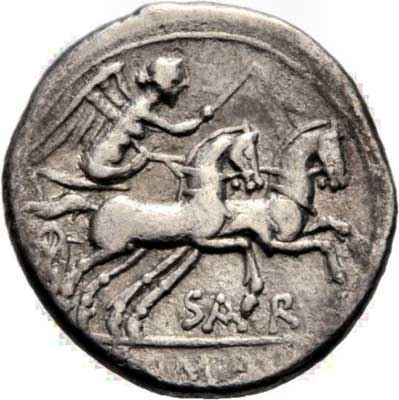Sex. Atilius Saranus was one of the moneyers for the year 155 BC. He served as Consul in 136 BC.
Gens Atilia, sometimes written Atillia, was a family at Rome, which had both patrician and plebeian branches. The first member of this gens who obtained the consulship was Marcus Atilius Regulus, in 335 BC. The Atilii continued to hold the highest offices of the state throughout the history of the Republic, and well into imperial times.
The cognomina of the Atilii under the Republic are Bulbus, Calatinus, Longus, Regulus, and Serranus; and of these the Longi were undoubtedly patrician. The only cognomen found on coins is Saranus, which appears to be the same as Serranus. Calatinus, also found as Caiatinus, probably refers either to the town of Cales in Campania, or to the neighboring town of Caia. One of the Atilii Reguli had previously obtained the surname Calenus in consequence of a battle fought at Cales in 335 BC.
Gens Atilia, sometimes written Atillia, was a family at Rome, which had both patrician and plebeian branches. The first member of this gens who obtained the consulship was Marcus Atilius Regulus, in 335 BC. The Atilii continued to hold the highest offices of the state throughout the history of the Republic, and well into imperial times.
The cognomina of the Atilii under the Republic are Bulbus, Calatinus, Longus, Regulus, and Serranus; and of these the Longi were undoubtedly patrician. The only cognomen found on coins is Saranus, which appears to be the same as Serranus. Calatinus, also found as Caiatinus, probably refers either to the town of Cales in Campania, or to the neighboring town of Caia. One of the Atilii Reguli had previously obtained the surname Calenus in consequence of a battle fought at Cales in 335 BC.

No coins matching the search term(s)
